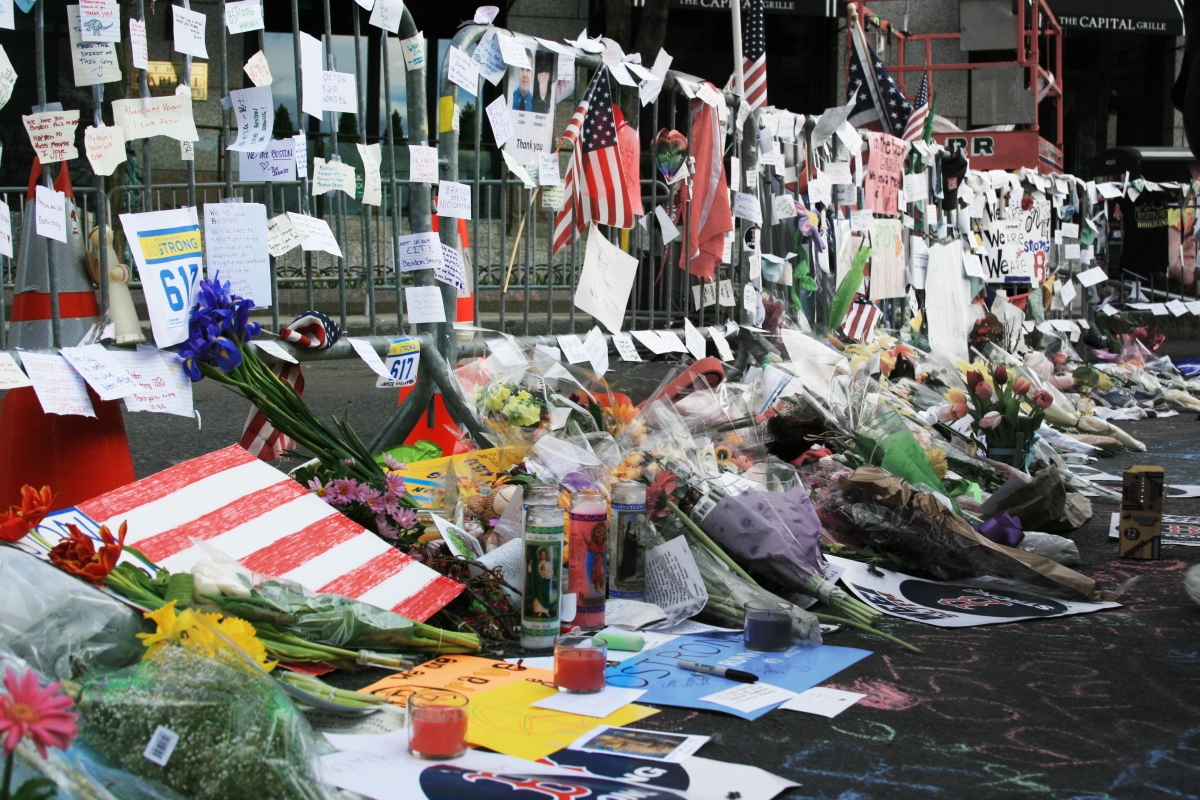I wrote the outline for this essay on Monday, April 15th. It had been an especially good day: I had even won myself a coveted window seat on the third floor at Snell Library.
I was reading Judith Butler’s Precarious Life when I heard the news. I should have panicked. I should have been terrified. I should have been emotionally distraught over the bombing’s victims. But I had spent a few days inside Butler’s head, and I couldn’t pull away from our glaring vulnerability. There’s nothing I can do, I thought. What is the use in panicking? I guess now I understand how the Afghanis feel on a regular basis.
Forgive me. I know that this essay is in pieces. On the other hand, Butler has already made the excuse for my incoherence: in grief, my self-conscious narrative would be interrupted and undone by the unraveling of myself.[1] Nowadays, I clutch onto Butler’s description of grief to diagnose what I feel. I was nowhere near the bombs, and none of my friends were physically hurt. I don’t feel like I have the right to say that I am grieving. Still, I do identify with what Butler calls the “submission” to grief. We understand that, with loss, we cannot be “masters of ourselves.”[2]
To Butler, grieving is an identification with suffering itself, and a chance for public and patient political reflection.[3] When we are grieving, we are forcibly reminded how vulnerable we are to loss, both relational and physical. Our grief should inspire us to end violence and strengthen our global political community. Taking an eye for an eye is counterproductive, because it leaves everyone blind.[4]
These ideas are not new. Abstractly, everybody knows that the “right” thing to do is to end the cycle of hate. However, in the United States, restorative justice rarely supersedes retributive justice; politicians that favor the former system are seen as “soft on crime”. Butler acknowledges the practical difficulty of her position, stating that ethics is “precisely a struggle to keep fear and anxiety from turning into murderous action.”[5]
The events of 9/11 left the United States contemplating a decidedly retributive reaction. At the most fundamental level, its recognition of the subject of vulnerability presupposed that “vulnerability” deviates from the norm. It is not that we’ve never had security; it’s that our security has been taken away from us. In understanding vulnerability to be “soft” and “feminine”, the U.S. resolved to take decisive action in order to “restore the loss”.[6] In order to secure its borders, the U.S. suspended constitutional rights and spied on its citizens.[7] In order to avenge its victims, the U.S. invaded and left collateral damage in its path. In order to assert its sovereignty and recover its mastery, the U.S. acted self-centeredly and lost the respect of other nations.
Butler is making a simple and gentle suggestion: that we become mindful of the precariousness of life. In many ways, she echoes Richard Rorty, who believed that human rights could simply be achieved with a “sentimental education.” [8] It is not that we need to lock in an essential understanding of what it means to be human, it’s that we need to genuinely recognize different people as human. It is not that we are sociopathic to human suffering, it’s that we are apathetic to “pseudo-human” woes. Despite this innocuous “no strings attached” approach, I still find Butler’s suggestions emotionally exhausting. To what extent, for example, should I recognize the Tsarnaevs as human? Would it be unethical to parade in the streets over Dzhokhar Tsarnaev’s capture? Not only do Butler’s suggestions make me constantly vulnerable, but they also make me constantly responsible for everyone. Upon hearing of the Boston Marathon bombs, my friend’s first thought was to go to Boylston Street and help out. Upon hearing of the bombs, my first thought was one of resigned acceptance. Have I become so overwhelmed that I’ve given up?
I also doubt whether my reactions were ethical. As runners rushed to donate blood, as homeowners offered their space to stranded runners, as students painstakingly wrote heartfelt Facebook statuses, I couldn’t stop myself from thinking of First World privilege. The outpouring of support was well-intentioned, but it also showed the enormous disconnect between “us” and “others.” There were so many people that wanted to help where help wasn’t needed; the Red Cross did not need extra blood, and the runners had no need for extra housing. Why couldn’t we extend the same compassion to Afghani families or even homeless Americans?
At the same time, is there any way that I could be truly satisfied with anyone’s response? If I point out that Afghani citizens balk under terrorism every day, would that belittle the Marathon victims? Why can’t I just focus on what is happening in front of me; why do I have to overthink everything? Why can’t I just buy the Boston Marathon t-shirt for $15 and be done with it? Am I being critical for the sake of being critical?
As I write this, White Hat is being hunted by the police. My first final has been canceled; my essay outline has been widely ignored; everybody has been drawn to the TV screens. I call my parents. They are blithely and maddeningly nonchalant, they are “invulnerable.”
“I can’t stop thinking about it,” I confess. “I can’t even distract myself with class work. I have to constantly confront myself on this issue—there’s no way to forget about it. I’m so sick of everything.”
“You can’t think so deeply about this,” my dad chides. “You can’t feel so much. Write your essay without thinking too much. You haven’t even been directly impacted by this! We know—we were there during 9/11. You have to stop opening yourself up like this.”
Wendy Chu
Political Science & Economics ’17
[1]Butler, Judith. Precarious Life: The Powers of Mourning and Violence. London: Verso, 2004. 21. Print.
[2]Ibid., 21.
[3]Ibid., xii.
[4]“An Eye for an the Whole World Blind.” N.p., 27 Dec. 2010. Web. 19 Apr. 2013.
[5]Butler, Judith. Precarious Life: Eye Will Make The Powers of Mourning and Violence. London: Verso, 2004. xviii. Print.
[6]Ibid., 29.
[7]Ibid., xi.
[8]Hayden, Patrick. The Philosophy of Human Rights. St. Paul, MN: Paragon House, 2001. 254. Print.



